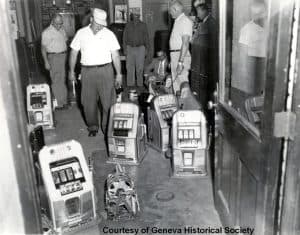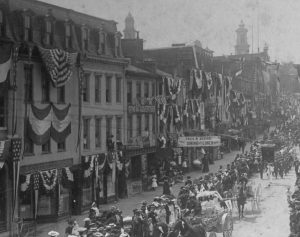Got A Nickel?
By Becky Chapin, Archivist

A police enthusiast, PB Oakley photographed Geneva police confiscating several slot machines in June 1956. The exact location is unknown, there was no report in the newspaper.
Slot machines are a fairly recent invention. A precursor to the modern slot machine developed in 1891 in NYC was based on poker, costing a bar patron one nickel to spin. Unlike today, winnings were usually a free beer, cigar, or something the hosting establishment sold. Newspapers in Geneva were mentioning slot machines by the late 1890s, but mostly in connection with the removal of the machines from bar rooms, cigar stores, and any other businesses. In January 1898, 15 were removed by Geneva police around town.
By June 1898, Chief Daniel Kane had been meeting with the police commissioners about slot machines “of the gambling variety” that were present in a few hotels and attracting many young men. The owners got wind of a possible raid and “quietly” removed the machines from their places. The machines reappeared only to disappear again in November, with an announcement towards the end of the month that all the machines had been removed from Geneva’s saloons. Fraudulent nickels were then found in the defunct machines in December, collected by the police as evidence.
The court of appeals eventually declared slot machines a gambling device in 1901, to the surprise of no one, which meant any place that sold liquor could not have a slot machine as it would violate their liquor license. But the machines prevailed.
Two brothers were arrested in 1902 after complaints were made by members of the YMCA junior department who played on the machines in John and Harry Mayer’s newsroom. Their arrest prompted many to throw out their machines again. Arguments about what constituted gambling with a slot machine were rampant from the 1890s through early 1900s. If you always received a ‘prize’ after putting in your nickel or penny, was it really gambling? Gum machines came under attack in Rochester where a penny would yield a stick of gum and occasionally a ticket worth 5-25¢ in trade.
The most interesting saga was that of the Peck & Beebe saloon case in 1905 regarding the “Wonder Clock.” The clock was a slot machine which cost a nickel, but for the cost of a nickel a patron could see a few pictures with advertisements, hear a tune, and receive a check for a beer or cigar to trade at the bar. But, the newspaper reasoned, it would cost the patron the same amount to outright buy the beer or cigar. Since the patron was assured a beer or cigar, there was no gambling.
But the appellate court declared the Wonder Clock a gambling device in July 1906. After several appeals throughout the court system, the decision was reversed in November 1908 and Peck & Beebe (among other saloon owners) put the clock back up.
Police in 1929 confiscated a slot machine operated out of the basement of Francis Madia’s cigar store and he was ordered to appear in court where he likely only received a fine. In 1933, police staged a raid in downtown Geneva, seizing 4 machines and arresting 4 business owners after operatives from a Rochester detective agency went undercover and provided information about the machines.
In May 1934, Chief RW Morris ordered slot machines and “mint” machines removed from businesses following the signing of the Esquirol bill by Governor Lehman. After this law, the only type of legal slot machines were telephone pay stations and gum vending machines.
A resurgence of slot machines prompted a federal law signed by President Truman in 1951 prohibiting inter-state shipment of slot machines defined as “operated by a coin or token on the basis of chance.” Many manufacturers started converting their factories to war production as a result.
Why write about slot machines? It seemed like an interesting topic to cover when gambling in 1898 included inserting a penny in a machine to receive a piece of gum.

